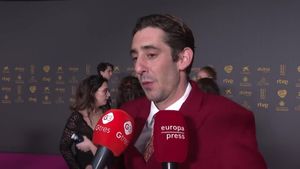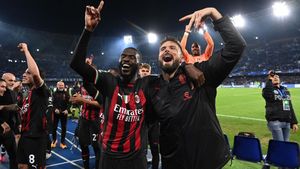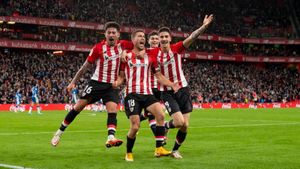The Trump administration’s recent actions against the International Criminal Court (ICC) have drawn significant attention, with some analysts believing these measures are playing directly to the Kremlin’s advantage. President Donald Trump signed an executive order imposing sanctions on the ICC, fundamentally reshaping the dynamics surrounding the court’s decisions to investigate alleged war crimes, particularly those involving Russian President Vladimir Putin.
The sanctions were swiftly welcomed by Moscow. Kremlin officials have expressed approval of the U.S. measures, which they view as easing pressure on Putin following the ICC's issuance of an arrest warrant accusing him of war crimes related to the invasion of Ukraine. This warrant was met with immediate condemnation from Trump, who described the ICC’s actions as "illegitimate and baseless," particularly emphasizing its scrutiny of Israel’s actions in Gaza.
Retired General Keith Kellogg, Trump’s envoy to Ukraine, shed light on the duality of these moves, stating on The New York Post, "You could really increase the sanctions." This statement underlines the complexity of the current geopolitical situation, where U.S. sanctions might be both lenient and stringent depending on the strategic objectives.
Central to this narrative is the recently halted Task Force KleptoCapture, which aimed to target Russian oligarchs and confiscate their assets abroad. Attorney General Pam Bondi announced this reorientation of focus away from Russian interests toward combating global cartels, which may suggest diminished enforcement toward Russian entities previously targeted by the Biden administration.
The ICC's response to the sanctions has been firm. Despite facing considerable pressure, Karim Khan, the ICC prosecutor who issued the arrest warrant for Putin, was named among the first individuals to face U.S. sanctions, which include asset freezes and barring entry to the United States for him and his family members.
According to reports by Reuters, the ICC is resolute, asserting it remains committed to pursuing accountability for war crimes against Russia, particularly through the continuing investigation of reported atrocities committed during the invasion of Ukraine. Heorhii Tykhyi, spokesperson for Ukraine’s Ministry of Foreign Affairs, emphasized, "The ICC will continue to hold the Russians accountable for war crimes committed in Ukraine, notwithstanding the sanctions imposed by the U.S." This highlights the determination of the court to maintain its operational integrity even amid external pressures.
Following the executive order, some unnamed Kremlin officials praised Trump's decision, claiming it provided Moscow with increased maneuverability on the global stage. One Russian diplomat was quoted saying, "It gives the (Russian) President, his team and his security services more maneuverability when planning travel." Such sentiments appear to reflect a broader belief within Russia’s corridors of power: the sanctions are beneficial for enhancing their strategic flexibility.
While the immediate consequences of the sanctions may favor Russia, analysts warn of the potential for intensified U.S. measures if conditions do not improve. General Kellogg pointed out the likely increase of sanctions on Moscow, highlighting the U.S. administration's capacity to escalate its approach if deemed necessary to prompt negotiations or changes from the Kremlin.
Despite the apparent easing of some measures against Russia, observers note the larger geopolitical chess game being played. The ICC holds significant sway, having already made waves by probing accusations against world leaders, including Israeli Prime Minister Benjamin Netanyahu, who has also faced potential arrest for his actions during the Gaza conflict. The interplay of international law and national interests continues to create tension, as illustrated by Trump’s rhetoric and the subsequent responses from both Moscow and the ICC.
Looking forward, the effectiveness of the Trump administration’s sanctions on the ICC remains unclear. The complexity of U.S.-Russia relations signifies potential for both confrontation and collaboration, depending on how the situation evolves. Will the Kremlin use this opportunity to solidify its actions abroad, or will it provoke stronger responses from the West? Only time will reveal the true impact of these sanctions and the broader consequences for international relations.



